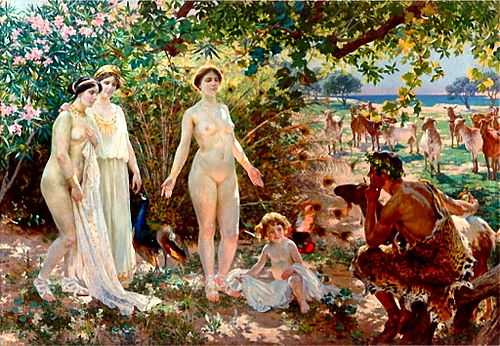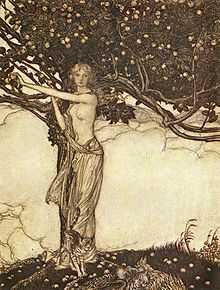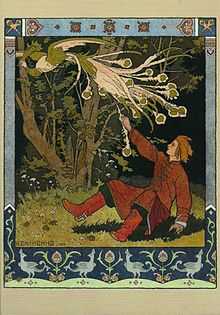Golden apple
The golden apple is an element that appears in various national and ethnic folk legends or fairy tales. Recurring themes depict a hero (for example Hercules or Făt-Frumos) retrieving the golden apples hidden or stolen by a monstrous antagonist. Alternatively, they are depicted as divine food and the source of immortality in Norse mythology.
Greek mythology
Three instances of golden apples were featured in Greek mythology:
Atalanta
.jpg)
The first case concerns a huntress named Atalanta who raced against a suitor named Melanion. Melanion used golden apples to distract Atalanta so that he could win the race.
Though abandoned by her father as an infant, Atalanta became a skilled hunter and received acclaim for her role in the hunt for the Calydonian boar. Her father claimed her as his daughter and wished to marry her off. However, Atalanta was reluctant to marry due to a prophecy that marriage would be her downfall. Because of her beauty, she gained a number of suitors and finally agreed to marry, but under the condition that her suitor was obligated to beat her in a footrace. Competitors who failed to beat her would be put to death. As Atalanta could run extremely fast, all her suitors died.
Realizing that Atalanta could not be defeated in a fair race, Melanion prayed to Aphrodite for help. The goddess gave him three golden apples and told him to drop them one at a time to distract Atalanta. Sure enough, she quit running long enough to retrieve each golden apple. It took all three apples and all of his speed, but Melanion finally succeeded, winning the race and Atalanta's hand.
Eventually they had a son Parthenopaios, who was one of the Seven against Thebes. Their marriage ended in misfortune when they were transformed into lions (which the Greeks believed were unable to mate with their own species, only with leopards) for offending the gods.
The Garden of the Hesperides
_11.jpg)
The Garden of the Hesperides, Atlas' daughters, was Hera's orchard in the far western corner of the world, where either a single tree or a grove of trees bearing immortality-giving golden apples grew. Hera placed in the garden a never-sleeping, hundred-headed dragon (named Ladon) as an additional safeguard. The 11th Labor of Hercules was to steal the golden apples from the garden. He stole the apples by asking Atlas to steal the apples and in return he would hold up the sky for him. After Atlas picked the apples Hercules asked Atlas to hold up the sky for him while he made a pad of the lion skin. He never took back his job of holding up the sky and ran away.
The Judgement of Paris

Zeus held a banquet in celebration of the marriage of Peleus and Thetis. Eris, the goddess of discord, was not invited for her troublesome nature, and upon turning up uninvited, she threw a golden apple into the ceremony, with an inscription that read: "ΤΗΙ ΚΑΛΛΙΣΤΗΙ" (Ancient Greek: τῇ καλλίστῃ tē(i) kallistē(i), Modern Greek: τη καλλίστη ti kallisti; "for/to the most beautiful" – cf. Callisto). Three goddesses claimed the apple: Hera, Athena, and Aphrodite. They brought the matter before Zeus. Not wanting to get involved, Zeus assigned the task to Paris of Troy. Paris had demonstrated his exemplary fairness previously when he awarded a prize unhesitatingly to Ares after the god, in bull form, had bested his own prize bull.
Zeus gave the apple to Hermes and told him to deliver it to Paris and tell him that the goddesses would accept his decision without argument. As each goddess wanted to receive the apple, they each stripped off their own clothing and appeared naked before Paris. Each of the goddesses also offered Paris a gift as a bribe in return for the apple; Hera offered to make him the king of Europe and Asia, Athena offered him wisdom and skill in battle, and Aphrodite offered him the most beautiful woman in the world as his wife, Helen of Sparta (later to be titled Helen of Troy). Paris chose Aphrodite, a decision that ultimately led to the start of the Trojan war. Paris soon went to celebrate the marriage of Helen and Menelaus with his brother. They spent the night there, and Menelaus was called to Agamemnon, and thus Helen and Paris were left alone. In this time they made love, and Helen left Menelaus to sail to Troy with Paris, thus initiating the Trojan War.
Norse mythology

In Norse mythology, the golden apples are the source of the gods' immortality and perpetual youth; comparable to the role of ambrosia in Greek mythology. They are cultivated by—and most often associated with—the goddess Iðunn.
In myth
In the book Skáldskaparmál, Iðunn is mentioned in its first chapter (numbered as 55) as one of eight ásynjur (goddesses) sitting in their thrones at a banquet in Asgard for Ægir.[1] In chapter 56, Bragi tells Ægir about Iðunn's abduction by the jötunn Þjazi. Bragi says that after hitting an eagle (Þjazi in disguise) with a pole, Loki finds himself stuck to the bird, and being pulled further and further into the sky, his feet banging against stones, gravel, and trees, and he felt his arms might be pulled out from his shoulders. Loki shouted and begged the eagle for a truce, and the eagle responds that Loki would only be freed if he made a solemn vow to have Iðunn come outside of Asgard with her apples. Loki accepts and returns to his friends Odin and Hœnir. At the time the Þjazi and Loki agreed on, Loki lures Iðunn out of Asgard into "a certain forest", telling her that he had discovered some apples that she would find worth keeping, and told Iðunn that she ought to bring her apples with her so that she may compare them with the apples Loki discovered. Þjazi arrives in eagle shape, snatches Iðunn, flies away with her, and takes her to his home, Þrymheimr.[2]
The Æsir begin to grow grey and old at the disappearance of Iðunn. The Æsir hold an assembly thing, where they ask one another when Iðunn had been seen last. The Æsir realize that the last time that Iðunn was seen was when she was going outside of Asgard with Loki, and so they have Loki arrested and brought to the assembly, where he is threatened with death and torture. Terrified, Loki says that he will search for Iðunn in the land of Jötunheimr if the goddess Freyja will lend him her "falcon shape". Freyja lends the falcon shape to Loki, and with it he flies north to Jötunheimr, and arrives a day later at Þjazi's home. Loki finds that Þjazi is out in a boat at sea, and that Iðunn is home alone. Loki turns her into a nut, holds her in his claws, and flies away with her as fast as possible.[2]
Upon Þjazi's arrival home, he finds that Iðunn is gone. Þjazi assumes his eagle shape, and chases after Loki, causing a storm wind. The Æsir see a falcon flying with a nut, as well as the pursuing eagle, so they go outside from Asgard, with loads of wood shavings. The falcon flies over the fortification, and drops down by the wall. The eagle is unable to stop when he misses the falcon, the feathers of the eagle catch fire, and he falls. The Æsir, close by, kill the jötunn Þjazi within the gates of Asgard, "and this killing is greatly renowned."[2]
In Der Ring des Nibelungen
In Richard Wagner's Der Ring des Nibelungen, the golden apples have their own leitmotif. It is first sung by Fafner, when he explains to his brother Fasolt why they must take Freia away from the gods.
Fairy tales

Many European fairy tales begin when golden apples are stolen from a king, usually by a bird:
- "Tsarevitch Ivan, the Fire Bird and the Gray Wolf" (Russian)
- "The Golden Bird" (German)
- "The Golden Mermaid" (German)
- "The Nine Peahens and the Golden Apples" (Serbian/Bulgarian)
- "Prâslea the Brave and the Golden Apples" (Romanian, where the thief is not a bird but a zmeu)
- "The Three Brothers and the Golden Apple" (Bulgarian, where the thief is not a bird but a zmey)
- "The White Snake" (German)
Modern literature
The William Butler Yeats poem "The Song of the Wandering Aengus", has the lines:
- I will find out where she has gone
- And kiss her lips and take her hands;
- And walk among the dappled grass,
- And pluck till time and times are done
- The silver apples of the moon,
- The golden apples of the sun.
The Augusta, Lady Gregory play called The Golden Apple: A Play for Kiltartan Children is a fable in the invented Kiltartan dialect based on Irish mythology and folklore.
A golden apple plays a crucial role in the climax of David Mitchell's sixth novel The Bone Clocks, published by Random House in 2014.
Discordianism
The contemporary religion Discordianism draws upon the Golden Apple of the goddess Eris, also known as the "Apple of Discord", which Eris used to set off the conflict among the goddesses of Olympus that lead to the Trojan War because she was not invited to a party (the so-called "Original Snub". Emblazoned upon the apple is the word "Kallisti" ("to the fairest"). The golden apple can be seen as a metaphor for a practical joke meant to cause cognitive dissonance in the target.
Identity and use in other languages
Argan fruit
Michael Hübner has suggested that the fruit of the Argan tree, endemic to the Sous Valley in present day Morocco, may be the golden apples of the Hesperides. Arguing that the location matches most closely the description given in classical texts of Atlantis and the garden of the Hesperides, he notes that the ripe fruits look like small golden apples and have an aroma like baked apples. He equates the fruit, the seeds of which produce Argan oil, with Plato's account of Atlantean fruits "which afford liquid and solid food and unguents", and proposes that the trees' almost reptilian-scale like bark and thorns may have inspired the mythical guardian dragon of the golden apples, Ladon.[3]
Oranges
In many languages, the orange is referred to as a "golden apple". For example, the Greek χρυσομηλιά, and Latin pomum aurantium both literally describe oranges as "golden apples". Other languages, like German, Finnish, Hebrew, and Russian, have more complex etymologies for the word "orange" that can be traced back to the same idea.[4]
In later years it was thought that the "golden apples" of myth might have actually been oranges, a fruit unknown to Europe and the Mediterranean before the Middle Ages. Under this assumption, the Greek botanical name chosen for all citrus species was Hesperidoeidē (Ἑσπεριδοειδῆ, "hesperidoids"). It was also used by Carl Linnaeus, who gave the name Hesperidesto an order containing the genus Citrus, in allusion to the golden apples of the Hesperides, and is preserved in the term Hesperidium for the fruits of citrus and some other plants.
One reason why oranges might be considered to be "magical" in so many stories is because they bear flowers and fruit at the same time, unlike other fruit.
Quinces
Frequently, the term "golden apple" is used to refer to the quince, a fruit originating in the Middle East.[5]
Tomatoes
The tomato, unknown to the ancient world of the Greeks, is known as the pomodoro in Italian, meaning "golden apple" (from pomo d'oro).
See also
- Apples and oranges
- Front Deutscher Äpfel
- Garden of Eden
- Hesperidium
- The Golden Apples of the Sun
- Jambudvipa
- Minecraft
References
- ↑ Faulkes (1995:59).
- ↑ 2.0 2.1 2.2 Faulkes (1995:60).
- ↑ Hübner, Michael. "Circumstantial Evidence for Plato's Island Atlantis in the Souss-Massa plain in today's South-Morocco". pp. 20–21.
- ↑ Orange (Citrus sinensis [L.] Osbeck) Etymology, Gernot Katzer, Gernot Katzer Spice Pages, formerly University of Graz, February 3, 1999
- ↑ Arnot, Sharon (April 26, 2004). "Quince, the 'Golden Apple'". Sauce Magazine.